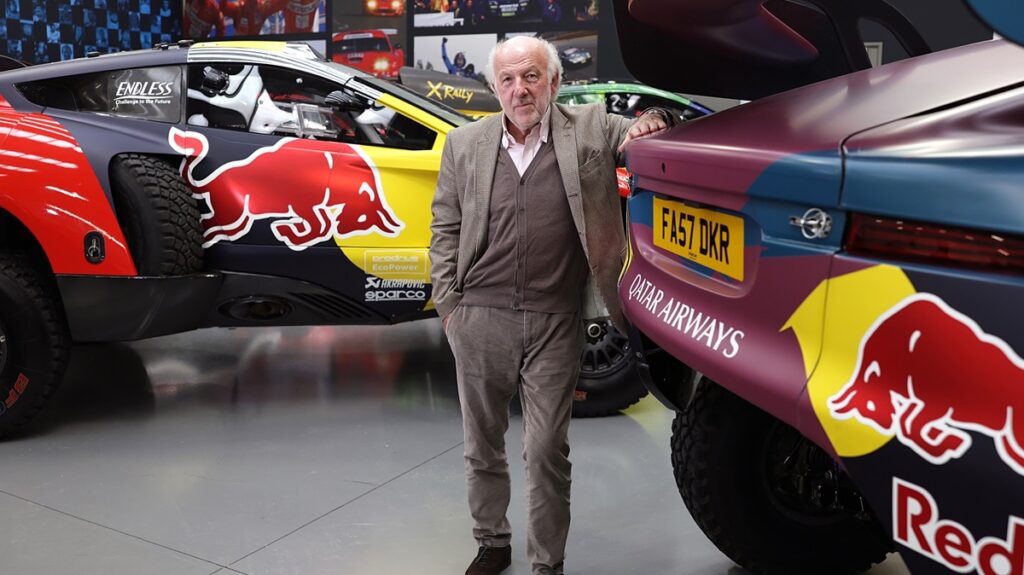The power of delegation
Plus, the new flexible-working trial, Wetherspoons to close more pubs and why we should pay more attention to departing CEOs in today's Off To Lunch

This article is an online version of our Off to Lunch newsletter. Sign up to receive it straight to your inbox here.
As the new Labour government looks for ways to drive the UK economy forward, our new podcast episode may hold some of the answers. We examine how the UK has become a world-leading hub for motorsport and advanced manufacturing. We do this by speaking to David Richards about the story behind his Prodrive business, which was founded 40 years ago.
Richards was on the podium at Silverstone on Sunday for the British Grand Prix, giving the third-place trophy to Lando Norris. He did so in his role as chairman of Motorsport UK, the governing body for four-wheel racing in the UK. That role highlights the status and success that Richards has enjoyed.
Prodrive employs around 800 people in the UK. It is a fascinating business, one that manufactures high-tech parts for a range of vehicles but also runs motorsport teams and makes sports kits. It is based on the outskirts of Banbury, Oxfordshire. In this area of the UK, you will find the headquarters of the majority of Formula 1 teams and a collection of advanced manufacturing businesses. Prodrive’s neighbours include the Haas F1 team and Collins Aerospace, which makes parts for planes.
Prodrive started off running rally teams before expanding into a range of different areas, including manufacturing. Richards helped Subaru, the Japanese car maker, to launch its world rally team in the 1990s and managed that team as Colin McRae became the first British driver to win the World Rally Championship in 1995.

The success of that team transformed Subaru as a brand and is a business case study in itself. Richards and Prodrive would then go on to turn around the BAR Formula 1 team, whose drivers included a young Jenson Button. BAR became the Mercedes team that a decade later dominated the sport with Lewis Hamilton.
A key lesson from Richards’ story is the power of delegation and trusting the team around you. “I trust people a lot. I’m probably not good enough at defining my expectations for people, but I’ve got better at that over the years,” Richards says. “They’re empowered to get on with things. Sometimes you make mistakes and sometimes you give roles to people that are beyond their capabilities for various reasons. But that is your problem, not theirs.”
And the reason why the UK leads the way in motorsport and advanced manufacturing? People. “I think you get spin-offs from different companies. You’ll start with one and you go,” he says. “We’re not far from the traditional West Midlands motor industry and we’ve got Silverstone on the doorstep. Once you start one organisation then people leave that and set up on their own.”
Richards says the role of government in all this should be to “applaud and promote rather than interfere”.
You can hear this story in full by listening to the latest episode of Business Leader on Spotify here, Apple here or Acast here
Business Question
Guess the company
- It was founded in 1979
- It employs more than 42,000 people
- Part of the company’s name originates from a character in a popular TV show in the 1970s
- Its founder became a knight in 2023
- Despite being in hospitality, it doesn’t believe in playing music or showing live sports
The answer can be found at the bottom of the page.
Business in Brief
Everything you need to know
1. Dyson is to cut around 1,000 jobs, equal to almost a third of its UK workforce, as it restructures amid “increasingly fierce and competitive global markets”. The company has told workers it will keep its R&D hub in the country but that there will be redundancies elsewhere in the business. “We have grown quickly and, like all companies, we review our global structures from time to time to ensure we are prepared for the future,” says CEO Hanno Kirner. You can read more here.
2. Renewable energy companies have begun prospecting for the first onshore windfarms in more than a decade after the new Labour government lifted restrictions on where turbines could be placed. One of the UK’s biggest wind developers, RWE, says it has begun identifying suitable sites, while EDF Renewables, RES Group and Coriolis Energy have also confirmed plans. You can read more here.
3. The 4 Day Week Campaign is to run a new pilot project on flexible working as it looks to convince the new government that there should be changes in how people work. Companies can currently sign up for a November start, with the pilot testing policies including a shorter working week, flexible start and finish times, a nine-day fortnight, and compressed hours. Its previous pilot, in 2022, saw 61 companies switch to a four-day week, where people work 80 per cent of their hours but retain full pay. Some 54 of those who took part still had the new arrangements in place a year and a half later. You can read more here.
4. Wetherspoons is to sell or close more of its pubs despite an improvement in sales. So far this year, the company has opened two pubs but sold or surrendered the lease on 26 and is planning to sell a further 10. Nevertheless, like-for-like sales were up by 5.8 per cent in the 10 weeks to 7 July and are up 7.7 per cent so far this year. The pub group’s chairman Sir Tim Martin says total sales are at “record levels” but, in a warning to the new chancellor Rachel Reeves, is calling on the government to implement “tax equality” between pubs and supermarkets or risk more closures across the sector. You can read more here.
5. Graphcore has reached a deal to sell the company that means all its employees have had the value of their shares wiped, according to reports. Sifted says that the Japanese investor SoftBank has acquired the firm for around $500m (£390m), less than the total amount invested in the firm to-date. You can read more here.
Business Quotes
Inspiration from leaders
“Done is better than perfect.”
– Sheryl Sandberg
Business Thinker
Ideas on the future of business and leadership
1. ⚽ The stutter run-up is Euro 2024’s trending penalty technique – but why do players do it? ⚽
2. ? We should pay more attention to departing CEOs ?
3. ? Inside LVMH’s AI Factory ?
4. ⬆️ How can I scale-up as a start-up CEO? ⬆️
And finally…
Almost 25 years since the Roman general Maximus Decimus Meridius was betrayed by Commodus and reduced to slavery, Gladiator is back. A trailer for the new film, originally titled Gladiator II, went live yesterday and has already had more than 11 million views on YouTube.
The sequel stars Pedro Pascal, Paul Mescal, Connie Nielsen and Denzel Washington and follows Lucius, the former heir to the Roman Empire, who becomes a gladiator after his home is invaded by the Roman army.
You can watch the full trailer here.
The answer to today’s Business Question is JD Wetherspoon



